
John Ernst Steinbeck was an American writer. He won the 1962 Nobel Prize in Literature "for his realistic and imaginative writings, combining as they do sympathetic humor and keen social perception". He has been called "a giant of American letters."

Of Mice and Men is a 1937 novella written by American author John Steinbeck. It narrates the experiences of George Milton and Lennie Small, two displaced migrant ranch workers, who move from place to place in California in search of new job opportunities during the Great Depression in the United States.

Of Mice and Men is a 1992 American period drama film based on John Steinbeck's 1937 novella of the same name. Directed and produced by Gary Sinise, the film features Sinise as George Milton, alongside John Malkovich as Lennie Small, with Casey Siemaszko as Curley, John Terry as Slim, Ray Walston as Candy, Joe Morton as Crooks, and Sherilyn Fenn as Curley's wife.
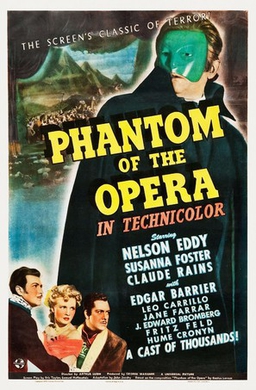
Phantom of the Opera is a 1943 American romantic horror film directed by Arthur Lubin, loosely based on Gaston Leroux's 1910 novel The Phantom of the Opera and its 1925 film adaptation starring Lon Chaney. Produced and distributed by Universal Pictures, the film stars Nelson Eddy, Susanna Foster and Claude Rains, and was composed by Edward Ward.

He Who Gets Slapped is a 1924 American silent psychological thriller film starring Lon Chaney, Norma Shearer, and John Gilbert, and directed by Victor Sjöström. The film was written by Victor Seastrom and Carey Wilson, based on the Russian play He Who Gets Slapped by playwright Leonid Andreyev, which was completed by Andreyev in August 1915, two months before its world premiere at the Moscow Art Theatre on October 27, 1915. A critically successful Broadway production, using an English language translation of the original Russian by Gregory Zilboorg, was staged in 1922, premiering at the Garrick Theatre on January 9, 1922, with Richard Bennett (actor) playing the "HE" role on stage. The Russian original was made into a Russian movie in 1916.
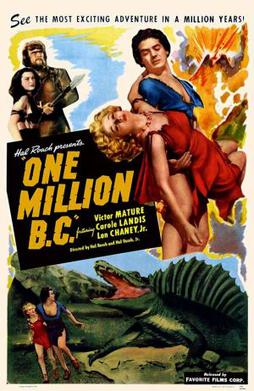
One Million B.C. is a 1940 American fantasy film produced by Hal Roach Studios and released by United Artists. It is also known by the titles Cave Man, Man and His Mate, and Tumak.

The Cowboys is a 1972 American Western film starring John Wayne, Roscoe Lee Browne, and Bruce Dern, and featuring Colleen Dewhurst and Slim Pickens. It was the feature film debut of Robert Carradine. Based on the 1971 novel of the same name by William Dale Jennings, the screenplay was written by Irving Ravetch, Harriet Frank, Jr., and Jennings, and the film was directed by Mark Rydell.

The Unknown is a 1927 American silent horror film directed by Tod Browning, and starring Lon Chaney as carnival knife thrower "Alonzo the Armless" and Joan Crawford as his beloved carnival girl Nanon. Originally titled Alonzo the Armless, filming took place from February 7 to March 18, 1927 on a $217,000 budget.
Man of a Thousand Faces is a 1957 American dark dramatic film detailing the life of silent film actor Lon Chaney, played by James Cagney.

The Penalty is an American psychological thriller crime film starring Lon Chaney and originally released in 1920 by Goldwyn Pictures. The movie was directed by Wallace Worsley, and written by Philip Lonergan and Charles Kenyon, based upon the pulp novel by Gouverneur Morris. The supporting cast includes Charles Clary, Doris Pawn, Jim Mason, and Claire Adams. The copyright for the film was owned by Gouverneur Morris, who wrote the novel on which the film was based. The budget for the film was $88,868.00. Portions of the film were shot in San Francisco.
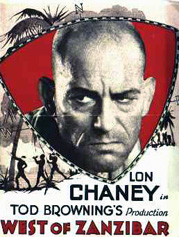
West of Zanzibar is a 1928 American synchronized sound film directed by Tod Browning. While the film has no audible dialog, it was released with a synchronized musical score with sound effects using both the sound-on-disc and sound-on-film process. The screenplay concerns a vengeful stage magician named Phroso who becomes paralyzed in a brawl with a rival. The supporting cast includes Mary Nolan and Warner Baxter. The screenplay was written by Elliott J. Clawson, based on the 1926 play Kongo by Charles de Vonde and Kilbourn Gordon. Walter Huston starred in the stage play and later played Phroso again in the 1932 sound film remake of the same story which was also called Kongo.

Pardners is a 1956 American comedy western film starring the comedy team of Martin and Lewis. It was released on July 25, 1956, by Paramount Pictures.

Welcome to Hard Times is a 1967 American Western film directed by Burt Kennedy and starring Henry Fonda as the leader of a dying town that is too weak to stand up to a brute terrorizing the few remaining residents. It is based upon a novel by the same name by E. L. Doctorow.

Tell It to the Marines is a 1926 American silent romantic drama film directed by George W. Hill and starring Lon Chaney, William Haines, and Eleanor Boardman. The film follows a Marine recruit and the sergeant who trains him. It was the biggest box office success of Chaney's career and the second biggest moneymaker of 1926/1927.

While the City Sleeps is a 1928 American synchronized sound crime drama film about a tough New York City police detective, played by Lon Chaney, out to catch a murdering gangster. While the film has no audible dialog, it was released with a synchronized musical score with sound effects using the sound-on-film Western Electric Sound System process. The film was directed by Jack Conway, written by Andrew Percival Younger, and co-starred Anita Page, Carroll Nye, Wheeler Oakman, and Mae Busch.
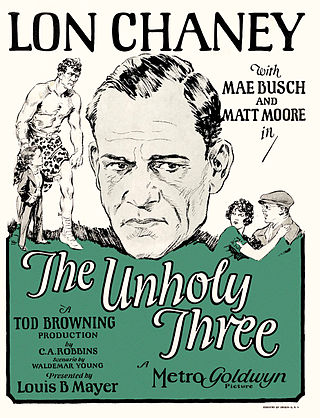
The Unholy Three is a 1925 American silent crime melodrama film involving a trio of circus conmen, directed by Tod Browning and starring Lon Chaney. The supporting cast features Mae Busch, Matt Moore, Victor McLaglen, and Harry Earles. The Unholy Three marks the establishment of the notable artistic alliance between director Browning and actor Chaney that would deliver eight films to M-G-M studios during the late silent film era.

Of Mice and Men is an opera in three acts by the American composer Carlisle Floyd. The English libretto was written by Floyd and is based on the 1937 novella of the same name by John Steinbeck. The opera was composed in 1969.
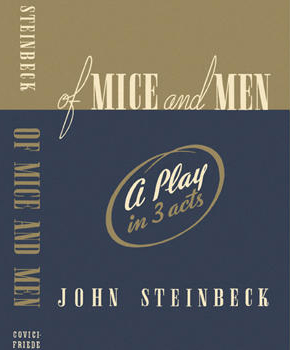
Of Mice and Men is a play adapted from John Steinbeck's 1937 novel of the same name. The play, which predates the Tony Awards and the Drama Desk Awards, earned the 1938 New York Drama Critics' Circle Best Play.

A Man's Country is a 1919 silent Western drama film directed by Henry Kolker, and starring Alma Rubens, Alan Roscoe, and Lon Chaney. It was written by Richard Schayer based on a screen story by John Lynch. The poster's tagline was "A forceful and spectacular drama of the primitive West in the days of the Gold Rush, when men fought hard, women lived fast and human life was cheap."
Of Mice and Men is a 1968 TV film. It was an adaptation of Of Mice and Men by John Steinbeck. It was part of ABC's "Theatre Nights".


















